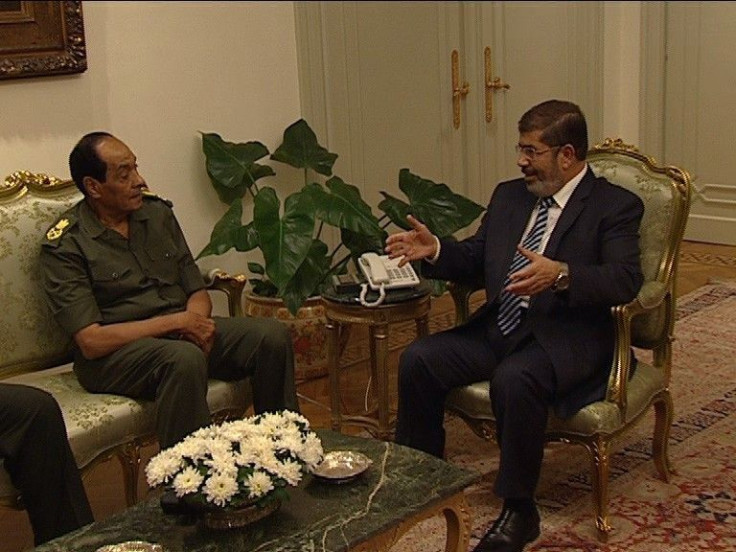Tantawi’s Sacking Does Not Mean End Of Mubarak’s Regime For Morsi Or Egypt

The sackings of former top Egyptian general Hussein Tantawi and Army Chief of Staff Gen Sami Annan, on Sunday were for the "benefit of this nation," said Egyptian President Mohamed Morsi, in a televised statement to his nation.
Tantawi's firing is widely seen as a positive move by those in Egypt who supported the revolution, but it hardly means that Morsi or the new government is free of the vestiges of the old regime.
"The generals have already been trying to undermine the Brotherhood for some time," said Samer Shehata, assistant professor of Arab Politics at the Center for Contemporary Arab Studies at Georgetown.
"They can continue to try to subvert them. There's a sword hanging over the constitutional committee, meaning that if they don't get the constitution written, the courts can rule that it's illegal and nullify it." At which point, considerable power would still remain in the hands of the Security Council of Armed Forces (SCAF), a body still teeming with Mubarak's former cronies.
Although it may seem odd that Tantawi stepped aside with so little fuss, Shehata was adamant that this was not a "civilian counter-coup" to a military coup, which is what Shadi Hamid of the Brookings Doha Center claimed on twitter. Shehata guessed there could be several reasons for that.
"We don't know if a deal was struck," he said. "There was no evidence pointing definitely in either direction. Clearly people have been thinking about this for more than a year and have been talking openly about what Tantawi and others want, including what's called a 'safe exit' from prosecution.
"[Tantawi] doesn't want to end up like Mubarak in a cage in jail," Shehata continued. "Hopefully he saw the writing on the wall and took a deal rather than [risk] his career. And he did it in a dignified way. This was really the smartest outcome ... Of course, it could be that he woke up and saw the TV and saw that he'd been replaced."
However it happened, Tantawi's departure has been heralded by supporters of the revolution.
"There's real change happening," said Shehata. "If this goes through, the president gets his powers restored, including as head of the military. I think it's a very positive development, regardless of what you think of the Muslim Brotherhood."
The Egyptian populace, for its part, has welcomed Tantawi's departure as just another step in Egypt shedding itself of Mubarak's legacy.
According to TIME, this is just the latest in the Brotherhood's "rearrangement of Egypt's political chessboard."
This play will serve as Morsi's attempt to regain some of the presidential powers the Security Council took away when he was sworn into office in June.
But Morsi has remained rather apologetic in light of what has been called a very bold move.
"The decisions I took today were not meant ever to target certain persons, nor did I intend to embarrass institutions, nor was my aim to narrow freedoms," Morsi said during a speech, according to the BBC.
© Copyright IBTimes 2025. All rights reserved.






















